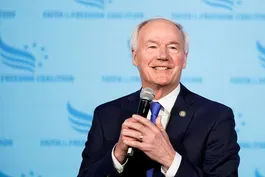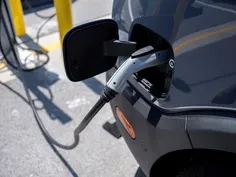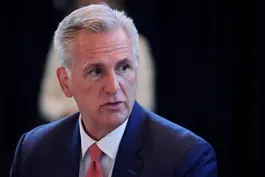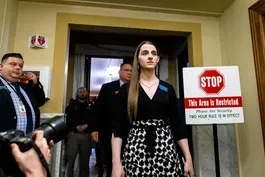
U.S., South Korea sign nuclear weapons agreement
Clip: 4/26/2023 | 8m 22sVideo has Closed Captions
U.S., South Korea sign nuclear weapons agreement in response to North Korean threats
President Biden welcomed the president of South Korea to the White House Wednesday for a state visit. They signed a wide-ranging declaration that enhances U.S.-Korean planning for the use of nuclear weapons in response to a North Korean attack. Nick Schifrin discussed the practical impact of the declaration with Bruce Klingner of the Heritage Foundation.
Problems with Closed Captions? Closed Captioning Feedback
Problems with Closed Captions? Closed Captioning Feedback
Major corporate funding for the PBS News Hour is provided by BDO, BNSF, Consumer Cellular, American Cruise Lines, and Raymond James. Funding for the PBS NewsHour Weekend is provided by...

U.S., South Korea sign nuclear weapons agreement
Clip: 4/26/2023 | 8m 22sVideo has Closed Captions
President Biden welcomed the president of South Korea to the White House Wednesday for a state visit. They signed a wide-ranging declaration that enhances U.S.-Korean planning for the use of nuclear weapons in response to a North Korean attack. Nick Schifrin discussed the practical impact of the declaration with Bruce Klingner of the Heritage Foundation.
Problems with Closed Captions? Closed Captioning Feedback
How to Watch PBS News Hour
PBS News Hour is available to stream on pbs.org and the free PBS App, available on iPhone, Apple TV, Android TV, Android smartphones, Amazon Fire TV, Amazon Fire Tablet, Roku, Samsung Smart TV, and Vizio.
Providing Support for PBS.org
Learn Moreabout PBS online sponsorshipAMNA NAWAZ: President Biden welcomed the president of South Korea, Yoon Suk-yeol, to the White House today for a state visit.
They signed a wide-ranging declaration that enhances U.S.-Korean planning for the use of nuclear weapons in response to a North Korean attack.
Nick Schifrin has our look at a key alliance and how the administration is responding to South Korean concerns about the U.S. commitment.
NICK SCHIFRIN: It's a 70-year-old alliance, but, today, in front of 7,000 people, the U.S. had to reassure South Korea the two countries would always walk side by side.
JOE BIDEN, President of the United States: It's an unbreakable bond forged in bravery and the sacrifice of our people.
NICK SCHIFRIN: President Biden hosted South Korean President Yoon Suk-yeol for a state visit and at a press conference announced what Yoon called unprecedented steps to deter North Korea.
YOON SUK-YEOL, South Korean President (through translator): So that we can achieve peace through the superiority of overwhelming forces, and not a false peace based on the goodwill of the other side.
NICK SCHIFRIN: Under today's Washington Declaration, the U.S. will make every effort to consult with South Korea on any possible nuclear weapons employment and share plans for their use, increase joint training for the possible use of nuclear weapons, and deploy those weapons to the Korean Peninsula with enhanced visibility.
South Korea reaffirmed the promise not to develop its own nuclear weapons.
The U.S. and South Korean militaries are integrated, but, until today, the U.S. has not officially shared its plans for when it would use a nuclear weapon.
YOON SUK-YEOL (through translator): Our two countries have promised to respond swiftly, overwhelmingly and decisively, using the full force of the alliance, including the United States' nuclear weapons.
NICK SCHIFRIN: President Biden didn't go that far, but repeated his administration's previously stated threat.
JOE BIDEN: A nuclear attack by North Korea against the United States or its allies or partisans -- partners is unacceptable and will result in the end of whatever regime, were it to take such an action.
NICK SCHIFRIN: It was Yoon himself who earlier this year raised doubts about the U.S. commitment to defend South Korea with American nuclear weapons.
In a newspaper interview in January, he said: "It is difficult to convince our people with just the idea of a U.S. nuclear umbrella" that's existed since the Korean War ended in the 1953 armistice.
South Korean concerns have been triggered by a record number of North Korean missile launches.
DONALD TRUMP, Former President of the United States: At some point into the future, I would like to save the money.
NICK SCHIFRIN: And South Korean doubts are also the product of former President Trump's hinting he would remove U.S. troops from South Korea if Seoul didn't contribute enough to their costs.
The U.S. also says a ballistic nuclear submarine will visit South Korea for the first time in 40 years.
It's an alliance born from war.
Last night, the presidents laid a wreath of remembrance at Washington's Korean War Veterans Memorial.
It remembers to 33,000 Americans and more than one million South Koreans killed in what the leaders hope will remain the last Korean War.
So, what will be the practical impact of today's declaration?
For that, we turn to Bruce Klingner, who had a 20-year career in the U.S. intelligence community focusing on North Korea.
He's now a senior research fellow at the Heritage Foundation.
Bruce Klingner, welcome back to the "NewsHour."
How significant is it that the U.S. has now pledged to consult with South Korea about the possible use of nuclear weapons and share its nuclear plans?
BRUCE KLINGNER, Former CIA Intelligence Analyst: I think it's very significant.
But, really, the Washington Declaration is directed more at Seoul than at Pyongyang.
It's designed more to reassure our ally than really any additional steps to deter North Korea.
So, the mutual defense treaty, the presence of our forces, et cetera, are all very effective in deterring North Korea.
But, lately, Pyongyang -- I'm sorry -- Seoul has been more nervous about our commitment.
And it's, as you pointed out, sort of the U.S. election results, as well as North Korea's growing capabilities and the growing doubt that there will be any kind of diplomatic resolution.
NICK SCHIFRIN: And, just to put a point on it, this reassurance that will occur inside what's being called the Nuclear Consultative Group about us nuclear plans, how much of a change is it from what the U.S. shares with South Korea today?
BRUCE KLINGNER: I think it will increase the amount of information that we share with them, as well as increase the involvement by South Korea in discussions and planning, as well as exercises.
The details are going to be very sensitive because it's dealing with nuclear weapons.
But, earlier this year, South Korean officials, both publicly and privately, said that they are concerned about the viability.
But Washington has taken a lot of actions in the last several months.
So now, when I talk to Korean officials, they say they're much more reassured.
They have much less concern about the U.S. viability of the extended deterrence guarantee.
So -- and, in the declaration today, South Korea not only affirmed that they would not pursue a nuclear weapons program, but stated quite clearly that they have -- they are reassured about the North -- the U.S. commitment.
NICK SCHIFRIN: So, to get that reassurance, as you just said, South Korea has reaffirmed its commitment under the Nuclear Non-Proliferation Treaty not to obtain nuclear weapons.
How significant is that pledge by South Korea today?
BRUCE KLINGNER: I think it's very significant.
There are sort of different lanes in the road in South Korea.
There are outside advocates for nuclear weapons by South Korea.
And, really, nothing is going to satisfy them, except a full-fledged South Korean nuclear weapons program.
In the middle is the public, which people will cite high public approval ratings for an indigenous nuclear weapons program.
But then, when the respondents are -- have explained to them the consequences of that action, then the support goes down.
And then sort of the third lane in the road is the South Korean government, which has been the least vocal in favor of it.
President Yoon has made a few misstatements which either he or his senior officials have quickly walked back.
And now they're publicly saying that they're feeling very reassured.
NICK SCHIFRIN: As we noted, South Korean officials have, of course, been very concerned about North Korea's advancements in terms of its nuclear and missile technology and, as we noted, some of President Trump's rhetoric.
You travel there often.
Do you believe South Koreans, both the people and the government, are also worried if Trump or some other isolationist president were elected next year?
BRUCE KLINGNER: Very much so.
In my engagement in Seoul and Tokyo with senior officials, they do point out they're very concerned, if a U.S. isolationist president is elected in 2024, that that president could resume the threats to reduce or remove U.S. forces, either over cost disputes or wanting to sort of reduce our exposure to enemies overseas.
So, North Korea does now have the capability of hitting the continental U.S. with nuclear weapons.
And that has led some in South Korea to say, would we really trade Seattle for Seoul?
Would we really risk an attack on U.S. cities in defense of our Asian allies?
And I would point out, we were willing to risk an estimated 100 million casualties in a nuclear exchange with the Soviet Union, in essence, risking Seattle, New York and Washington for Bonn, Paris, and London.
So -- and that was with a much more capable nuclear adversary, the Soviet Union, than North Korea.
NICK SCHIFRIN: And, quickly, Bruce Klingner, some in South Korea and the U.S. have wanted the administration to go further and redeploy American nuclear weapons to the peninsula, which were withdrawn back in the 1990s.
Just in a few seconds we have left, do you think the U.S. should have reconsidered that?
BRUCE KLINGNER: I don't think so.
It really doesn't make military sense to take the nuclear weapons off very-hard-to-find-and-target vehicles such as aircraft or submarines, and put in put them in a static bunker in South Korea, which would be a very lucrative preemptive target for North Korea.
It's better to leave them on the hard-to-find launch platforms.
NICK SCHIFRIN: Bruce Klingner, thank you very much.
Thank you very much.
BRUCE KLINGNER: Thank you for having me.
Asa Hutchinson launches run for GOP presidential nomination
Video has Closed Captions
Former Ark. Gov. Asa Hutchinson launches run for Republican presidential nomination (3m 38s)
Can charging network keep up with electric vehicle demand?
Video has Closed Captions
Demand for electric vehicles growing, but can charging network keep up? (9m 19s)
GOP passes McCarthy's debt ceiling bill by narrow margin
Video has Closed Captions
House Republicans approve Speaker McCarthy's debt ceiling bill by narrow margin (4m 16s)
Montana GOP bars trans lawmaker from House floor
Video has Closed Captions
Montana Republicans bar transgender lawmaker from House floor for rest of session (6m 37s)
New doctors prepare to tackle rural healthcare shortage
Video has Closed Captions
Next generation of doctors prepares to tackle rural healthcare shortage in West Virginia (7m 46s)
Proud Boys' seditious conspiracy trial in hands of jury
Video has Closed Captions
Seditious conspiracy trial against Proud Boys members in hands of jury (5m 30s)
Providing Support for PBS.org
Learn Moreabout PBS online sponsorshipSupport for PBS provided by:
Major corporate funding for the PBS News Hour is provided by BDO, BNSF, Consumer Cellular, American Cruise Lines, and Raymond James. Funding for the PBS NewsHour Weekend is provided by...

















